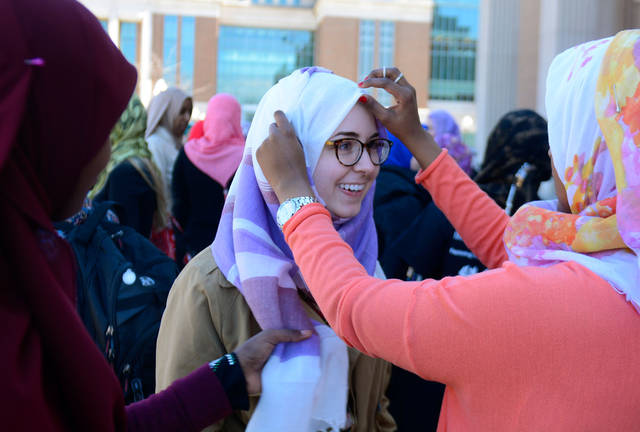
RNA - More than 350 University of Minnesota students covered their heads with hijabs in front of Coffman Union on Tuesday while Muslim students taught them about the importance of the headscarves in Islam.
It is one of several events hosted by the Al-Madinah Cultural Center and the Muslim Students Association to celebrate Islam Awareness Week and help clear up common misconceptions about Muslims.
Student groups hope this week will explain aspects of their culture and set the groundwork for a better community for Muslims on campus.
The many misunderstandings about the daily life of practicing Muslims can make situations uncomfortable for those who follow the faith and non-Muslims alike, AMCC President Nora Nashawaty said.
“We say that when we pray, and it’s tough to know that if I’m going to say it out loud, someone might think that I’m about to do something horrible,” Nashawaty said.
Lack of knowledge about Islam along with negative portrayals of Muslims in the media can result in misunderstandings, said English and family social science junior Inari Mohammed, a member of the Islam Awareness Week committee.
But events like Tuesday’s hijab handout help open communication paths with non-Muslims through personal interactions, she said, adding that many people came forward to learn more about the headscarves.
“They told us they don’t know why we wear hijab[s],” English and family social science junior Inari Mohammed, a member of the Islam Awareness Week committee, told Minnesota Daily.
“And so it’s a really good opportunity to answer the questions they do have.”
Because of the noticeable Muslim population on campus, it’s important not to be ignorant of the way they see the world, said linguistics senior Ben Slye, who attended a discussion about the meaning of modesty.
Slye asked at the meeting whether it was OK to compliment a Muslim woman on her hijab, which other attendees said would conflict with the headscarf’s purpose to maintain modesty.
“I don’t know the interactions that I’m supposed to be having [with Muslims], and I want to cultivate those relationships,” he said.
Family social science senior Samsam Mohamed wears her hijab both to abide by the Quran and as a personal choice.
“It’s security for me. I feel I’m secure. I’m safe,” she said. “For me, I have that inner peace of person. I really feel complete; I feel calm when I wear the [hijab].”
But in a literature class last year where she was the only Muslim, some of her classmates gave her looks as if questioning why she was there, Mohamed said.
Being more open-minded and willing to ask a person why they wear a hijab can help avoid these situations, she said.
Beyond Islam Awareness Week, Nashawaty hopes to continue bringing people of different cultures and religions together with the Al-Madinah Cultural Center’s “Real Talk” discussions, which the group started in response to the February shooting of three Islamic University of North Carolina students.
“We just really wanted to elucidate those struggles and also the really cool things our religion empowers us to do on a college campus,” Nashawaty said.
R111/108/A/